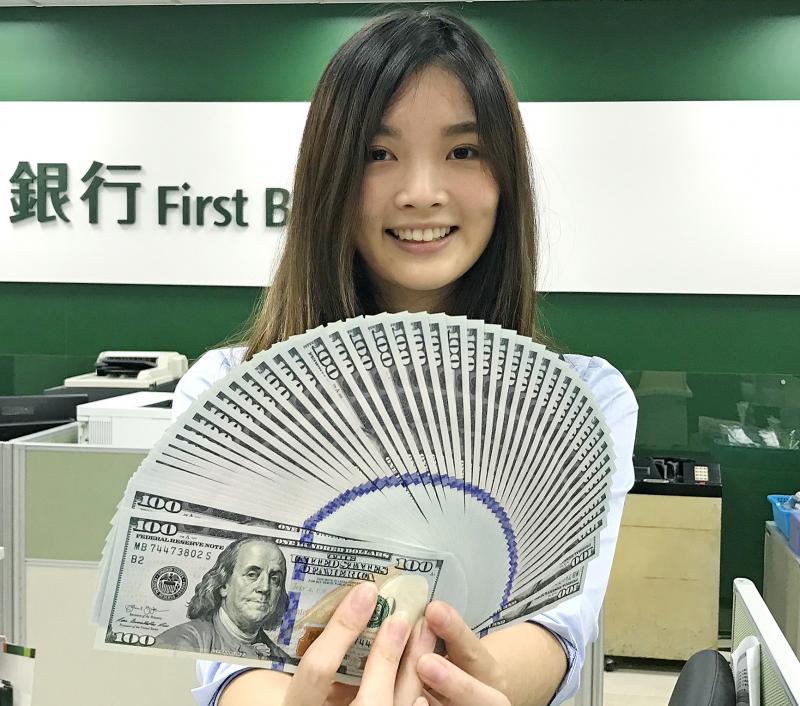The combined exposure of the nation’s financial holding companies to the US last quarter increased 4 percent on a quarterly basis to NT$6.84 trillion (US$246.6 billion), the highest of all overseas markets, due to rising investment in US stocks and bonds, data released on Tuesday last week by the Financial Supervisory Commission showed.
In the April-to-June period, the firms’ investment in the US totaled NT$6.08 trillion, up 3 percent from the first quarter, the data showed.
LENDING FALLS

Photo: Chen Mei-ying, Taipei Times
However, their combined lending to the US declined by 10 percent quarterly to NT$304 billion, while nonperforming loans fell 12.8 percent to NT$3.33 billion, the data showed.
Overall, the firms’ combined exposure to the US has risen 89 percent since the second quarter of 2016, when it totaled NT$3.62 trillion, the data showed.
CHINA EXPOSURE
By contrast, last quarter, the firms’ exposure to China — the second-largest overseas market — fell for a second consecutive quarter to NT$2.54 trillion, from NT$2.57 trillion in the first quarter.
Their combined investment in China last quarter fell 1.6 percent to NT$1.53 trillion, while lending in China remained flat at NT$656 trillion, the data showed.
TOP 10
The firms’ exposure to the UK (the third-largest overseas market) totaled NT$1.05 trillion, followed by France (No. 4) at NT$944 billion, Hong Kong (No. 5) at NT$900 billion and Australia (No. 6) at NT$708 billion, the commission said.
Last quarter, their exposure to South Korea (No. 7) rose 9.8 percent to NT$708 billion due to an increase in investment and loans, followed by Japan (No. 8) at NT$673 billion, Canada (No. 9) at NT$556 billion and United Arab Emirates (No. 10) at NT$491 billion, the data showed.

Taiwan will prioritize the development of silicon photonics by taking advantage of its strength in the semiconductor industry to build another shield to protect the local economy, National Development Council (NDC) Minister Paul Liu (劉鏡清) said yesterday. Speaking at a meeting of the legislature’s Economics Committee, Liu said Taiwan already has the artificial intelligence (AI) industry as a shield, after the semiconductor industry, to safeguard the country, and is looking at new unique fields to build more economic shields. While Taiwan will further strengthen its existing shields, over the longer term, the country is determined to focus on such potential segments as

UNCERTAINTY: Innolux activated a stringent supply chain management mechanism, as it did during the COVID-19 pandemic, to ensure optimal inventory levels for customers Flat-panel display makers AUO Corp (友達) and Innolux Corp (群創) yesterday said that about 12 to 20 percent of their display business is at risk of potential US tariffs and that they would relocate production or shipment destinations to mitigate the levies’ effects. US tariffs would have a direct impact of US$200 million on AUO’s revenue, company chairman Paul Peng (彭雙浪) told reporters on the sidelines of the Touch Taiwan trade show in Taipei yesterday. That would make up about 12 percent of the company’s overall revenue. To cope with the tariff uncertainty, AUO plans to allocate its production to manufacturing facilities in

COLLABORATION: Given Taiwan’s key position in global supply chains, the US firm is discussing strategies with local partners and clients to deal with global uncertainties Advanced Micro Devices Inc (AMD) yesterday said it is meeting with local ecosystem partners, including Taiwan Semiconductor Manufacturing Co (TSMC, 台積電), to discuss strategies, including long-term manufacturing, to navigate uncertainties such as US tariffs, as Taiwan occupies an important position in global supply chains. AMD chief executive officer Lisa Su (蘇姿丰) told reporters that Taiwan is an important part of the chip designer’s ecosystem and she is discussing with partners and customers in Taiwan to forge strong collaborations on different areas during this critical period. AMD has just become the first artificial-intelligence (AI) server chip customer of TSMC to utilize its advanced

Chizuko Kimura has become the first female sushi chef in the world to win a Michelin star, fulfilling a promise she made to her dying husband to continue his legacy. The 54-year-old Japanese chef regained the Michelin star her late husband, Shunei Kimura, won three years ago for their Sushi Shunei restaurant in Paris. For Shunei Kimura, the star was a dream come true. However, the joy was short-lived. He died from cancer just three months later in June 2022. He was 65. The following year, the restaurant in the heart of Montmartre lost its star rating. Chizuko Kimura insisted that the new star is still down